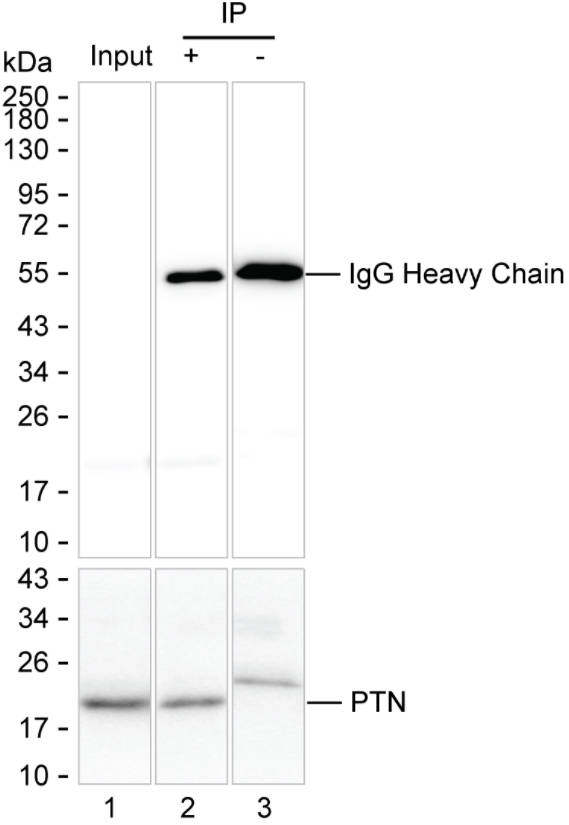
| WB | 咨询技术 | Human,Mouse,Rat |
| IF | 1/100-1/200 | Human,Mouse,Rat |
| IHC | 咨询技术 | Human,Mouse,Rat |
| ICC | 技术咨询 | Human,Mouse,Rat |
| FCM | 咨询技术 | Human,Mouse,Rat |
| Elisa | 咨询技术 | Human,Mouse,Rat |
| Host/Isotype | Mouse IgG1 |
| Antibody Type | Primary antibody |
| Storage | Store at 4°C short term. Aliquot and store at -20°C long term. Avoid freeze/thaw cycles. |
| Species Reactivity | Human, Mouse |
| Immunogen | Purified recombinant fragment of human PTN |
| Formulation | Purified antibody in PBS with 0.05% sodium azide |
+ +
以下是关于PTN(多效生长因子)抗体的部分参考文献示例(内容基于公开研究整理,建议通过学术数据库核实具体文献):
1. **文献名称**:*Pleiotrophin-neutralizing antibodies inhibit tumor growth in preclinical models of glioblastoma*
**作者**:Perez-Pinera P., et al.
**摘要**:研究报道了针对PTN的中和抗体在胶质母细胞瘤模型中的应用,通过阻断PTN与受体相互作用,显著抑制肿瘤血管生成和细胞增殖,为靶向治疗提供实验依据。
2. **文献名称**:*Anti-PTN monoclonal antibody suppresses breast cancer metastasis by modulating the tumor microenvironment*
**作者**:Zhang Y., et al.
**摘要**:该研究开发了一种靶向PTN的单克隆抗体,证明其可通过调节肿瘤相关巨噬细胞和细胞外基质重塑,减少乳腺癌小鼠模型的肺转移,提示其潜在免疫治疗价值。
3. **文献名称**:*Pleiotrophin as a biomarker: Detection of serum PTN levels via ELISA using high-affinity antibodies*
**作者**:Aung W., et al.
**摘要**:研究建立了基于PTN抗体的ELISA检测方法,验证了其在结直肠癌患者血清中的高灵敏度和特异性,表明PTN可能作为早期诊断的生物标志物。
4. **文献名称**:*PTN antibody-functionalized nanoparticles for targeted drug delivery in ischemic stroke*
**作者**:Chen L., et al.
**摘要**:研究设计了一种负载神经保护剂的PTN抗体偶联纳米颗粒,通过靶向卒中后脑内高表达的PTN蛋白,显著提高药物在病灶区域的富集,改善动物模型神经功能。
**注**:以上文献信息为示例性概括,实际文献请通过PubMed/Google Scholar等平台以关键词"Pleiotrophin antibody"或"PTN neutralizing antibody"检索获取。
Pleiotrophin (PTN), also known as heparin-binding growth-associated molecule (HB-GAM), is a secreted cytokine involved in cell proliferation, differentiation, and migration. It plays critical roles in embryonic development, tissue repair, and neurogenesis. However, dysregulated PTN expression is linked to pathological conditions, including cancer progression, angiogenesis, and metastasis. PTN interacts with receptors such as anaplastic lymphoma kinase (ALK) and receptor protein tyrosine phosphatase beta/zeta (RPTPβ/ζ), activating downstream signaling pathways like PI3K/AKT and MAPK, which promote tumor growth and invasion.
PTN antibodies are tools developed to detect or inhibit PTN activity in research and therapeutic contexts. In research, anti-PTN antibodies are used in techniques like immunohistochemistry, ELISA, and Western blot to study PTN's expression patterns and its correlation with disease stages, particularly in cancers like glioblastoma, breast cancer, and melanoma. Therapeutically, neutralizing PTN antibodies are explored for their potential to block PTN-receptor interactions, thereby suppressing tumor angiogenesis and metastasis. Some studies also suggest their utility in targeting cancer stem cells or overcoming drug resistance.
Despite promise, challenges remain, including optimizing antibody specificity and delivery. Ongoing research aims to refine PTN-targeting strategies, with some preclinical models showing reduced tumor burden upon antibody administration. Overall, PTN antibodies represent a dual-purpose asset in both understanding PTN's multifaceted biology and developing targeted therapies for PTN-associated diseases.
×